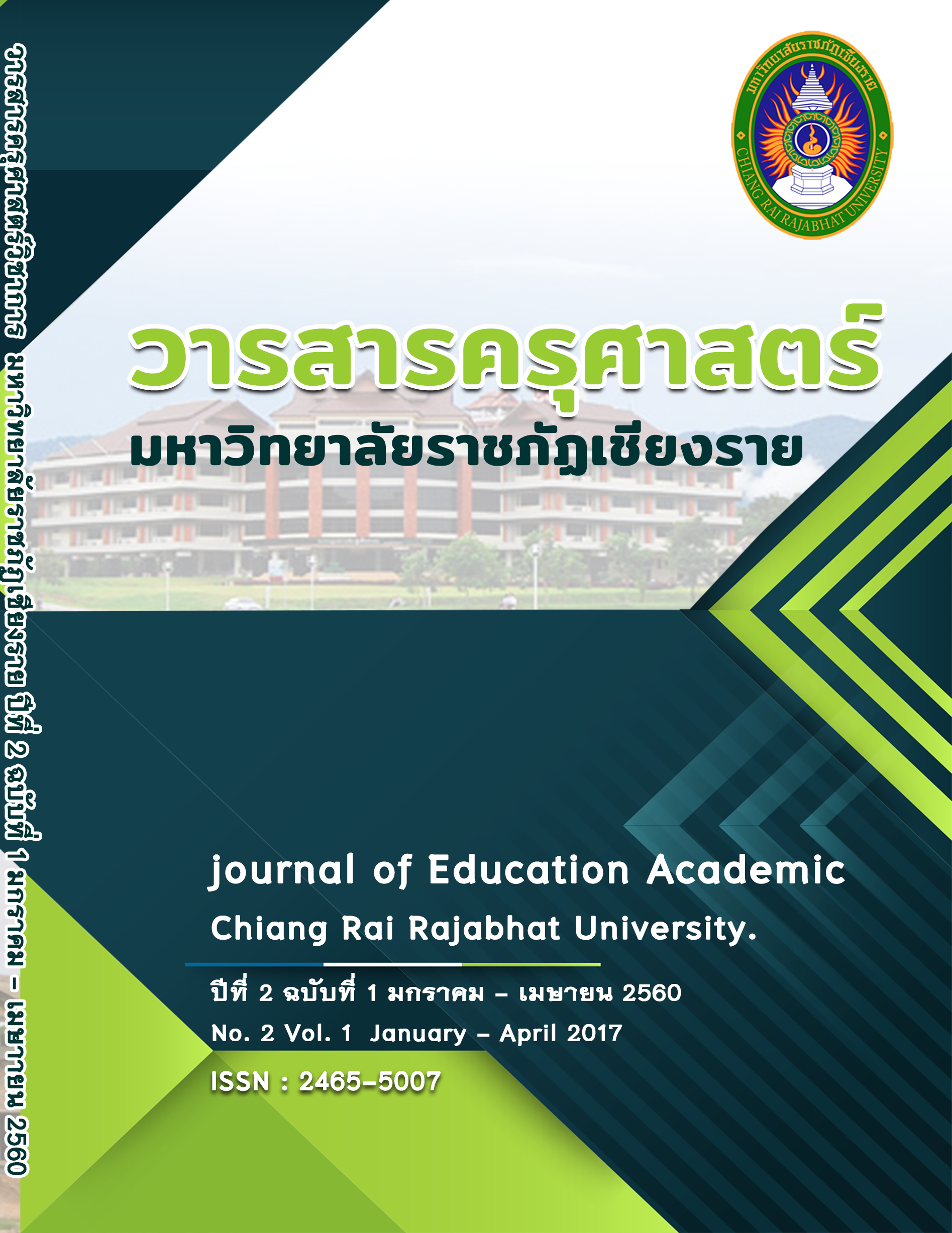The Guidelines for School Administrators Preparing for Participation in Pracharat School Project of Yonokwittaya School
Keywords:
School administration, public school projectAbstract
The objectives of this study were: 1) to investigate the school administration state of Yonokwittaya School and the questionnaire respondents were school administrators, teachers, and school committee members; 2) to analyze the policy and desirable characteristics of schools under Pracharat School Project and the data collection was administered by documentary analysis on the policy regarding Pracharat School Project; and 3) to develop the guidelines in preparing the schools for Pracharat School Project by means of focus group discussion and the informants were school administrators, heads of 4 disciplines, scholars from local administrative organization, and school administrators under Wieng Chiang Saen Education Development Networking Group. The results showed that:1. The state in the school’s administration under the framework of Pracharat School Project on 6 dimensions were: Curriculum development and learning procedure was found at the high level; Producing and developing teachers was found at the high level; Manpower and research development was found at the high level; Management was found at the high level; Evaluation and development of education standards was found at the high level; and ICT for education was found at the high level. 2. The analysis on policy and desirable characteristics of the school under Pracharat School Project indicated that the policy’s aim was to provide holistic development for the school with the involvement of private and public sectors by using technology as a tool in school administration. 3. The guidelines in preparing the schools for Pracharat School Project of Yonokwittaya School following the 4-dimension PDCA quality cycle and the 6-dimension Pracharat Framework were proposed. 1) Curriculum development and learning procedure: The school should set clear goals for the school’s curriculum based on the national core curriculum for basic education; administer the curriculum based on authentic learning; develop English skills using variety of media; arrange supervision and monitoring process on learning management plan and procedure based on amicable supervision; and usethe amicable supervision results on learning management plan, learning procedure, learning management outcome, and suggestions from educational supervisors to develop the learning management guidelines. 2) Producing and developing teachers: The school should provide training courses for teachers on educational technology and develop teachers as the defined framework; consistently monitor the skills and expertise development; use the monitoring results in diagnosing the aspects needed for further development. 3) Manpower and research development: The school should regulate teachers to do classroom research and research for developing school administration while teachers conduct classroom research on subject they are teaching; incorporate the monitoring results for analysis of problem in order to find solution for future implementation. 4) Management: The school should arrange training to develop school administrators regarding leader of change and allow teachers, staff, and stakeholders to get involved developing the education quality; monitor and evaluate strengths, weaknesses, opportunity, and threats. 5) Evaluation and education quality development: The school should evaluate and develop education standards by determining the guidelines for participatory educational administration in order to develop education quality; develop the guidelines tominimize obstacles resulted from the central government policy; develop education standards based on the focal points of the school and learner’s competence; evaluate the education development to recognize problems and obstacles in the operation; use the evaluation results for analysis of the guidelines in solving the problems; use the evaluation results on the education development operation in developing the guidelines for future implementation.
References
เตือนใจ ไพคานาม. (2553). สภาพและปัญหาการบริหารสถานศึกษาตามความคิดเห็นของข้าราชการครูวิทยาลัยเกษตรและเทคโนโลยี สังกัดสำนักงานคณะกรรมการอาชีวศึกษาในเขตภาคตะวันออกเฉียงเหนือ. (วิทยานิพนธ์ครุศาสตรมหาบัณฑิต). มหาวิทยาลัยราชภัฏอุบลราชธานี. อุบลราชธานี.
บัวย้อย กนนิตา. (2552). ความสัมพันธ์ระหว่างผู้นำการเปลี่ยนแปลงของผู้บริหารสถานศึกษากับประสิทธิผลการบริหารสถานศึกษาขั้นพื้นฐาน สังกัดสำนักงานเขตพื้นที่การศึกษาสุรินทร์เขต 3. (วิทยานิพนธ์ครุศาสตรมหาบัณฑิต). มหาวิทยาลัยราชภัฏสุรินทร์. สุรินทร์.
มังกร น้อยเมล์. (2556). ความต้องการ และแนวทางพัฒนาการบริหารจัดการศึกษาของสถานศึกษา สังกัดองค์กรปกครองส่วนท้องถิ่น. (วิทยานิพนธ์ครุศาสตรมหาบัณฑิต). มหาวิทยาลัยมหาสารคาม. มหาสารคาม.
สุวาท จอมทอง. (2551). การศึกษาการมีส่วนร่วมในการบริหารสถานศึกษาของคณะกรรมการสถานศึกษาขั้นพื้นฐานโรงเรียนที่เปิดสอนช่วงชั้นที่ 1-2 สังกัดสำนักงานเขตพื้นที่การศึกษามหาสารคามเขต1. (วิทยานิพนธ์ครุศาสตรมหาบัณฑิต). มหาวิทยาลัยราชภัฏมหาสารคาม. มหาสารคาม.






